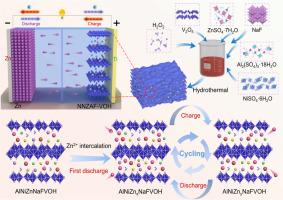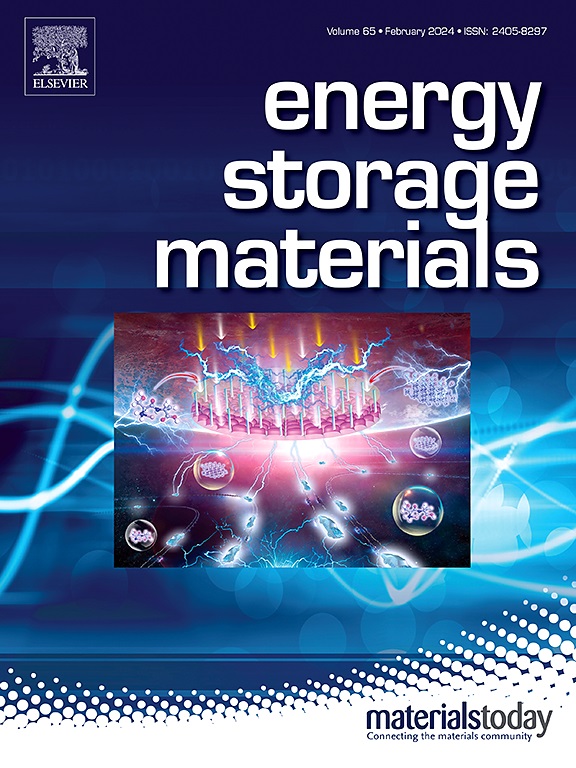A high-entropy zero-strain V-based cathode for high performance aqueous zinc-ion batteries
IF 18.9
1区 材料科学
Q1 CHEMISTRY, PHYSICAL
引用次数: 0
Abstract
Layered V-based V2O5·nH2O cathodes hold the merits of large Zn2+ diffusible interlayer spacing (11.5 Å) and high theoretical capacity (589 mA h g-1) in aqueous zinc-ion batteries (AZIBs). Meanwhile, they still suffer from defects of inferior structural stability and low intrinsic bulk conductivity. Herein, a high-entropy designed V2O5·0.48H2O cathode is developed by incorporating Na+, Ni2+, Zn2+, Al3+, and F- via a typical hydrothermal method. In-situ XRD and in-situ DRT trials profoundly clarify the impeccable zero-strain structural reversibility and stability, as well as augmented bulk conductivity during charging-discharging process. DFT calculations further verify the enhanced electronic transition capability and reduced diffusion energy barriers for the high-entropy cathode. This high-entropy cathode delivers superior working capacity (583.7 mA h g-1@0.06 A g-1), rate capabilities (200 mA h g-1@30 A g-1), and long-term cycle stability (351 mA h g-1@6 A g-1@5000 cycles@95.7%) with competent energy density (438 W h kg-1). Also, the pouch-cells with high-loading (80 mg) give reliable cycle and rate performance at both room (25 ℃; 451.3 mA h g-1@0.06 A g-1; 391.4 mA h g-1@0.6 A g-1@1000 cycles@94.6%) and low (-30 ℃; 190 mA h g-1@3 A g-1@2000 cycles@94%) temperatures, revealing enormous practicality and scientific values for advanced AZIBs.

求助全文
约1分钟内获得全文
求助全文
来源期刊

Energy Storage Materials
Materials Science-General Materials Science
CiteScore
33.00
自引率
5.90%
发文量
652
审稿时长
27 days
期刊介绍:
Energy Storage Materials is a global interdisciplinary journal dedicated to sharing scientific and technological advancements in materials and devices for advanced energy storage and related energy conversion, such as in metal-O2 batteries. The journal features comprehensive research articles, including full papers and short communications, as well as authoritative feature articles and reviews by leading experts in the field.
Energy Storage Materials covers a wide range of topics, including the synthesis, fabrication, structure, properties, performance, and technological applications of energy storage materials. Additionally, the journal explores strategies, policies, and developments in the field of energy storage materials and devices for sustainable energy.
Published papers are selected based on their scientific and technological significance, their ability to provide valuable new knowledge, and their relevance to the international research community.
 求助内容:
求助内容: 应助结果提醒方式:
应助结果提醒方式:


